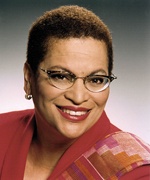 Research shows that this generation of young people, no matter of their race, are likely to do less well than their parents did. Shackled by a trillion dollars worth of student loans and a flat labor market, the New York-based Demos organization says the student loan burden prevents young people from buying homes and amassing wealth. While there are some racial gaps, many young people enter the labor market already behind the space their parents occupied.
Research shows that this generation of young people, no matter of their race, are likely to do less well than their parents did. Shackled by a trillion dollars worth of student loans and a flat labor market, the New York-based Demos organization says the student loan burden prevents young people from buying homes and amassing wealth. While there are some racial gaps, many young people enter the labor market already behind the space their parents occupied.
As I spend time with young people, especially young African Americans, I understand their frustration. They want to know what the civil rights generation has done to pass the baton of activism and improvement to them. They want to know how they should move forward. While they are willing to participate in marches and civic action, they want to know what's next. And they want to know why their voices are not heard in Black leadership.
Those who are seasoned offer their history of activism as proof that they should lead. They forged the Student Nonviolent Coordinating Committee and didn't ask their elders for permission. They pushed elders to move to a more active position and when elders would not meet them, they pushed themselves. There was no shame in their game. Whether militant or moderate, they embraced parts of the Black Panther Party political program, which begins with these words, "We want freedom, we want the power to determine our destiny." Too many of us, African Americans, young people, progressives, do not determine our destiny now. We flow with the wind.
Too many have dropped the baton, but continue to act as if they are clasping it. Too many mouth their interest in young leaders, but fail to bring them to the table. Too many who are 40 and 50 describe themselves as young, but if you tell the truth and shame the devil, these folks are solidly middle aged. So where are their protégées, those who will take, not snatch, the torch from them?
As I move around the country to speak, organize, motivate, I am stunned by events that focus on youth, but have only a few (and often no) young people present. Imagine if young people had the opportunity to have meaningful exchanges with their elders. Too often young people are segregated into a "youth" program when interaction with adults would be both motivating and stimulating to them. If we kick young people to the curb, we drop the baton that was handed to us. We baby boomers have a responsibility to both Generation X and Generation Y. We have shirked that responsibility.
I do not know how to describe Rev. Cecelia Bryant. I could call her mentor, role model, or friend. Or I could say that she is a great inspiration and, in a simple sentence, she has encapsulated the work that we must all to do move our community forward. You have to replicate yourself seven times, she said, and you have to ask those you replicated to replicate themselves seven times. In other words, there has to be an embrace, and a responsibility to embrace the next generation not only politically but also personally.
Who are the people who will come behind you? Who will incorporate your work into their own? Who will understand that you put your hand on them because somebody put their hand on you, and who will feel obligated to put their hand on others?
The civil rights generation made massive progress, but in many ways they dropped the ball. While they made it clear that there was work to be done, too many of them did not choose those who would do it. Too much energy and focus has been placed on one or two people, and we need cohorts of the next generation to work together.
My Baby Boom generation has dropped the ball as well. We have been beneficiaries of the Civil Rights Movement, but we have not passed our largess or our lessons on. The Baby Boom generation has been, in many ways, one of the most economically privileged generations of African American progress. So why do so many of us, who enjoy the legacy of this progress, fail to recognize the people and organizations that have brought us to this place.
Rev. Willie Barrow says that we are not as much divided as disconnected. When the baton has been dropped, what can we expect but a generational disconnection?
Julianne Malveaux is a Washington, D.C.-based economist and writer. She is President Emerita of Bennett College for Women in Greensboro, N.C.
- Home
- News
- Opinion
- Entertainment
- Classified
- About Us
 MLK Breakfast
MLK Breakfast- Community
- Foundation
- Obituaries
- Donate
11-16-2024 7:02 am • PDX and SEA Weather














































































































































































































































































































